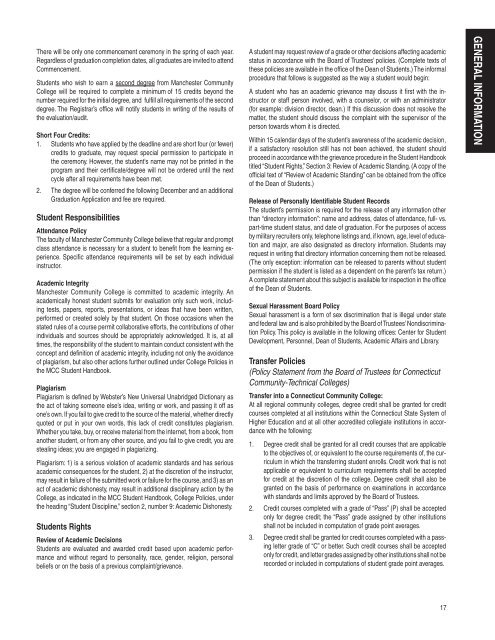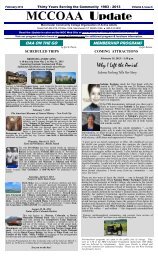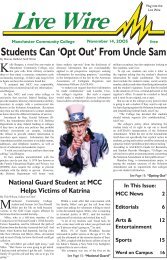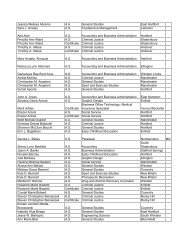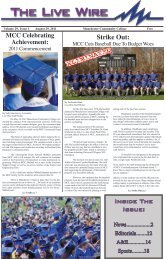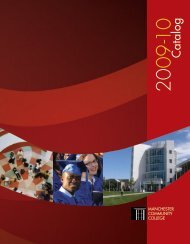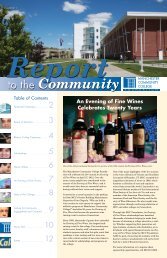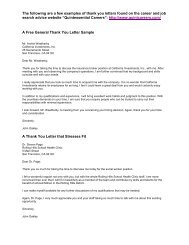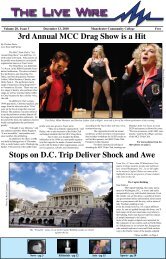Liberal Arts and Science - Manchester Community College ...
Liberal Arts and Science - Manchester Community College ...
Liberal Arts and Science - Manchester Community College ...
Create successful ePaper yourself
Turn your PDF publications into a flip-book with our unique Google optimized e-Paper software.
There will be only one commencement ceremony in the spring of each year.<br />
Regardless of graduation completion dates, all graduates are invited to attend<br />
Commencement.<br />
Students who wish to earn a second degree from <strong>Manchester</strong> <strong>Community</strong><br />
<strong>College</strong> will be required to complete a minimum of 15 credits beyond the<br />
number required for the initial degree, <strong>and</strong> fulfill all requirements of the second<br />
degree. The Registrar’s office will notify students in writing of the results of<br />
the evaluation/audit.<br />
Short Four Credits:<br />
1. Students who have applied by the deadline <strong>and</strong> are short four (or fewer)<br />
credits to graduate, may request special permission to participate in<br />
the ceremony. However, the student's name may not be printed in the<br />
program <strong>and</strong> their certificate/degree will not be ordered until the next<br />
cycle after all requirements have been met.<br />
2. The degree will be conferred the following December <strong>and</strong> an additional<br />
Graduation Application <strong>and</strong> fee are required.<br />
Student Responsibilities<br />
Attendance Policy<br />
The faculty of <strong>Manchester</strong> <strong>Community</strong> <strong>College</strong> believe that regular <strong>and</strong> prompt<br />
class attendance is necessary for a student to benefit from the learning experience.<br />
Specific attendance requirements will be set by each individual<br />
instructor.<br />
Academic Integrity<br />
<strong>Manchester</strong> <strong>Community</strong> <strong>College</strong> is committed to academic integrity. An<br />
academically honest student submits for evaluation only such work, including<br />
tests, papers, reports, presentations, or ideas that have been written,<br />
performed or created solely by that student. On those occasions when the<br />
stated rules of a course permit collaborative efforts, the contributions of other<br />
individuals <strong>and</strong> sources should be appropriately acknowledged. It is, at all<br />
times, the responsibility of the student to maintain conduct consistent with the<br />
concept <strong>and</strong> definition of academic integrity, including not only the avoidance<br />
of plagiarism, but also other actions further outlined under <strong>College</strong> Policies in<br />
the MCC Student H<strong>and</strong>book.<br />
Plagiarism<br />
Plagiarism is defined by Webster’s New Universal Unabridged Dictionary as<br />
the act of taking someone else’s idea, writing or work, <strong>and</strong> passing it off as<br />
one’s own. If you fail to give credit to the source of the material, whether directly<br />
quoted or put in your own words, this lack of credit constitutes plagiarism.<br />
Whether you take, buy, or receive material from the internet, from a book, from<br />
another student, or from any other source, <strong>and</strong> you fail to give credit, you are<br />
stealing ideas; you are engaged in plagiarizing.<br />
Plagiarism: 1) is a serious violation of academic st<strong>and</strong>ards <strong>and</strong> has serious<br />
academic consequences for the student, 2) at the discretion of the instructor,<br />
may result in failure of the submitted work or failure for the course, <strong>and</strong> 3) as an<br />
act of academic dishonesty, may result in additional disciplinary action by the<br />
<strong>College</strong>, as indicated in the MCC Student H<strong>and</strong>book, <strong>College</strong> Policies, under<br />
the heading “Student Discipline,” section 2, number 9: Academic Dishonesty.<br />
Students Rights<br />
Review of Academic Decisions<br />
Students are evaluated <strong>and</strong> awarded credit based upon academic performance<br />
<strong>and</strong> without regard to personality, race, gender, religion, personal<br />
beliefs or on the basis of a previous complaint/grievance.<br />
A student may request review of a grade or other decisions affecting academic<br />
status in accordance with the Board of Trustees’ policies. (Complete texts of<br />
these policies are available in the office of the Dean of Students.) The informal<br />
procedure that follows is suggested as the way a student would begin:<br />
A student who has an academic grievance may discuss it first with the instructor<br />
or staff person involved, with a counselor, or with an administrator<br />
(for example: division director, dean.) If this discussion does not resolve the<br />
matter, the student should discuss the complaint with the supervisor of the<br />
person towards whom it is directed.<br />
Within 15 calendar days of the student’s awareness of the academic decision,<br />
if a satisfactory resolution still has not been achieved, the student should<br />
proceed in accordance with the grievance procedure in the Student H<strong>and</strong>book<br />
titled “Student Rights,” Section 3: Review of Academic St<strong>and</strong>ing. (A copy of the<br />
official text of “Review of Academic St<strong>and</strong>ing” can be obtained from the office<br />
of the Dean of Students.)<br />
Release of Personally Identifiable Student Records<br />
The student’s permission is required for the release of any information other<br />
than “directory information”: name <strong>and</strong> address, dates of attendance, full- vs.<br />
part-time student status, <strong>and</strong> date of graduation. For the purposes of access<br />
by military recruiters only, telephone listings <strong>and</strong>, if known, age, level of education<br />
<strong>and</strong> major, are also designated as directory information. Students may<br />
request in writing that directory information concerning them not be released.<br />
(The only exception: information can be released to parents without student<br />
permission if the student is listed as a dependent on the parent’s tax return.)<br />
A complete statement about this subject is available for inspection in the office<br />
of the Dean of Students.<br />
Sexual Harassment Board Policy<br />
Sexual harassment is a form of sex discrimination that is illegal under state<br />
<strong>and</strong> federal law <strong>and</strong> is also prohibited by the Board of Trustees’ Nondiscrimination<br />
Policy. This policy is available in the following offices: Center for Student<br />
Development, Personnel, Dean of Students, Academic Affairs <strong>and</strong> Library.<br />
Transfer Policies<br />
(Policy Statement from the Board of Trustees for Connecticut<br />
<strong>Community</strong>-Technical <strong>College</strong>s)<br />
Transfer into a Connecticut <strong>Community</strong> <strong>College</strong>:<br />
At all regional community colleges, degree credit shall be granted for credit<br />
courses completed at all institutions within the Connecticut State System of<br />
Higher Education <strong>and</strong> at all other accredited collegiate institutions in accordance<br />
with the following:<br />
1. Degree credit shall be granted for all credit courses that are applicable<br />
to the objectives of, or equivalent to the course requirements of, the curriculum<br />
in which the transferring student enrolls. Credit work that is not<br />
applicable or equivalent to curriculum requirements shall be accepted<br />
for credit at the discretion of the college. Degree credit shall also be<br />
granted on the basis of performance on examinations in accordance<br />
with st<strong>and</strong>ards <strong>and</strong> limits approved by the Board of Trustees.<br />
2. Credit courses completed with a grade of “Pass” (P) shall be accepted<br />
only for degree credit; the “Pass” grade assigned by other institutions<br />
shall not be included in computation of grade point averages.<br />
3. Degree credit shall be granted for credit courses completed with a passing<br />
letter grade of “C” or better. Such credit courses shall be accepted<br />
only for credit, <strong>and</strong> letter grades assigned by other institutions shall not be<br />
recorded or included in computations of student grade point averages.<br />
17<br />
GENERAL INFORMATION


